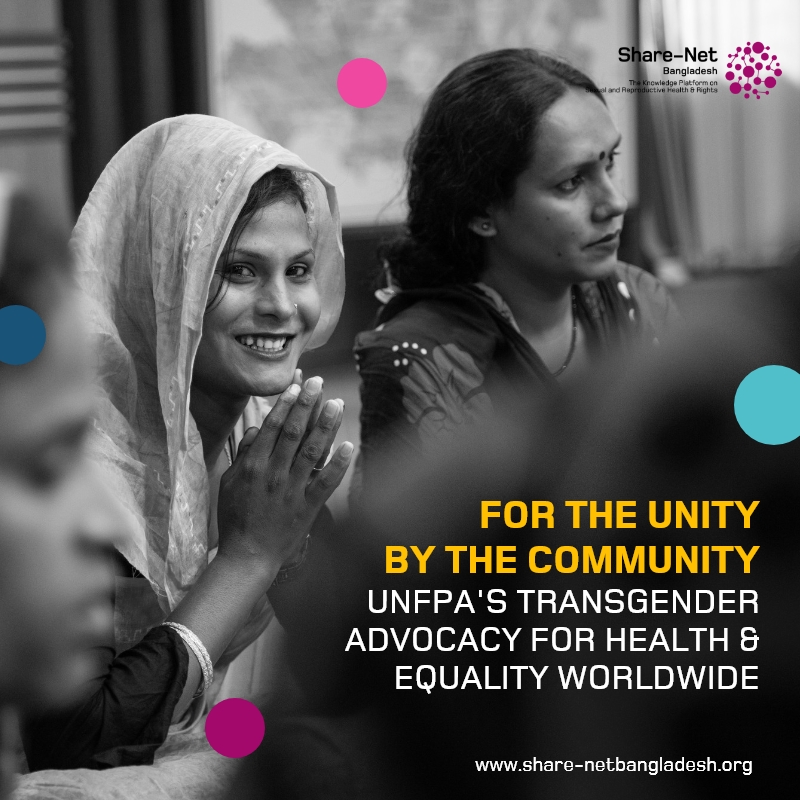By the Community, For the Unity: UNFPA’s Advocacy for Health and Equality Worldwide
“I have faced rejection from my family, my community, my entire society. I could not go to school,” said Mamouni, a transgender woman from Bangladesh. Despite the legal recognition of a third gender in 2014, hijra, or transgender and gender-diverse people, continue to face severe discrimination and marginalization.
Mamouni lives with 14 other hijra in a collective household in the Gaibandha district, an area frequently threatened by monsoon floods. “The last floods were very severe. The water reached our hips,” Mamouni recalled. “I had to sleep on a train line as I had nowhere to go and no support.” This situation highlights the unique vulnerabilities faced by sexual and gender minorities during natural disasters, where they often encounter discrimination and exclusion from relief efforts.
To address these challenges, UNFPA, the United Nations sexual and reproductive health agency, has stepped in to provide support. In 2020, anticipating seasonal floods, UNFPA supplied hijra across northwestern Bangladesh with financial aid and over 6,000 dignity kits, helping them prepare for and recover from disasters. This initiative aimed to ensure that marginalized communities are not left behind in humanitarian efforts.
Despite these efforts, hijra in Bangladesh still face significant barriers, especially in accessing healthcare. Research indicates that an overwhelming majority of transgender individuals who seek healthcare encounter harassment. Organizations like the Bandhu Social Welfare Society work to bridge this gap. In Cox’s Bazar, Bandhu ensures that sexual and gender minorities have access to essential health services. Purnima, a 47-year-old transgender volunteer, provides counseling, medical assistance, and legal aid to members of the transgender community at the Kutupalong refugee camp.
The situation in Bangladesh mirrors challenges faced by transgender individuals in other parts of the world. In Bhutan, Tshering Tshoki, a transgender rights advocate and Pride Bhutan outreach worker, has had a similar journey. “It was the rebirth of Tshering Tshoki,” she said, describing her experience of embracing her gender identity. Discrimination forced her to quit school after male classmates trapped her in a bathroom and doused her with water. When school officials ignored the incident, she left, highlighting the pervasive stigma against LGBTQIA+ individuals.
Support from transwomen role models abroad helped Tshering embrace her identity, and her family’s eventual acceptance marked a significant milestone. “Accepting your LGBT child is not about understanding their journey, it’s about loving them unconditionally, just as they are,” she told UNFPA.
Despite Bhutan decriminalizing same-sex relationships in 2021, stigma remains a significant barrier. A recent survey revealed that 80% of LGBTQIA+ respondents experienced discrimination, and nearly all felt their identity was a taboo topic. Tshering now helps transgender individuals access health check-ups and support for violence, working with UNFPA to connect them to sensitive sexual and reproductive healthcare and gender-based violence response services.
UNFPA’s collaboration with Bhutan’s government to update the National Gender Equality Policy includes issues crucial to sexual and gender minorities. “I got into this work to make people understand that transwomen are women,” Tshering said. “Every protection meant for women and girls—they deserve it.”
The stories of Mamouni and Tshering underscore the importance of inclusive and sensitive healthcare for transgender individuals. Ensuring joint collaboration between government bodies, NGOs, and community advocates is crucial. Policies must be updated to protect transgender rights, and healthcare providers must be trained to offer stigma-free services.
UNFPA’s support for community-led initiatives showcases the power of grassroots advocacy. By empowering transgender individuals to lead the fight for their own rights, we can make significant strides toward a world where everyone enjoys equal sexual and reproductive health and rights. This journey towards social harmony and mutual collaboration promises a brighter, more inclusive future for all.
Source: UNFPA News
Photo Credit: UNFPA Bangladesh


